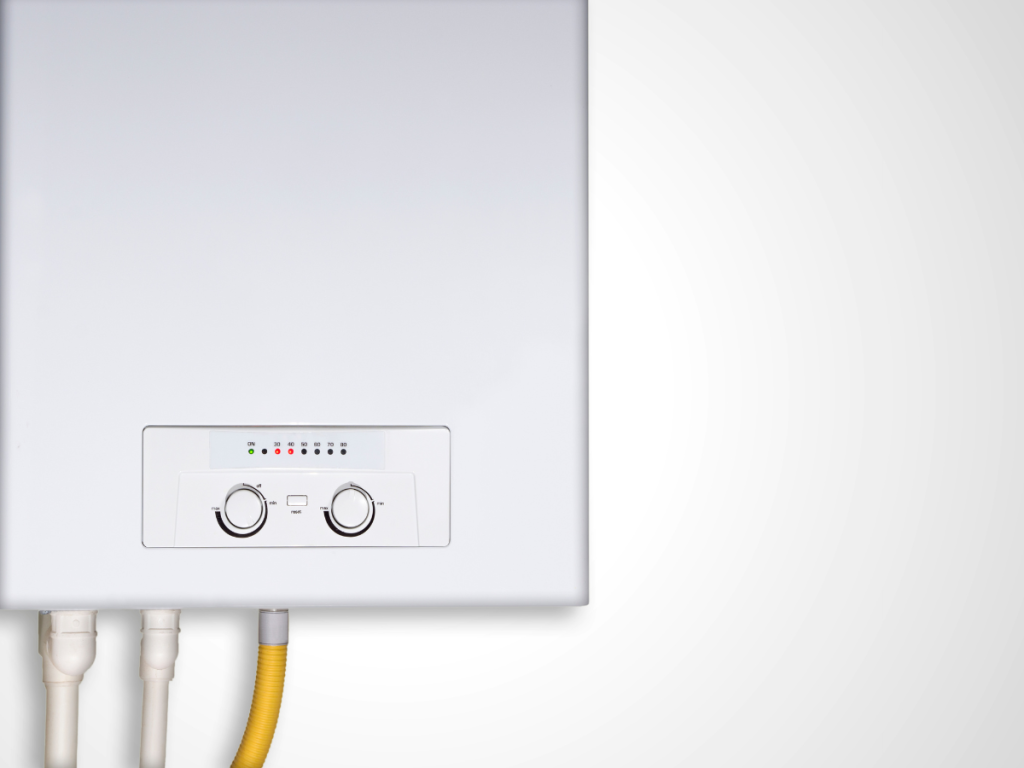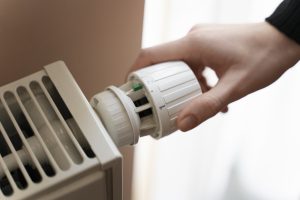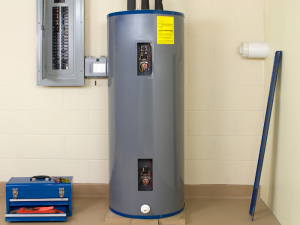A scaly water heater isn’t just unsightly; it’s not the greatest for efficiency either! Fortunately, water heater scaling is completely normal, and there are several ways to get rid of it.
If you have limescale build-up in your water heater, read below for why you should clean your water heater and some DIY descaling methods to get it sparkling and as good as new.
Why do tankless water heaters need descaling?
Scale build-up can hinder the efficiency of your tankless water heater, making regular descaling crucial to maintaining the lifespan and functionality of your unit.
Tankless heaters are an energy-efficient and space-saving alternative to traditional tank-style water heaters. As the name implies, they don’t store preheated water like tank-style systems do. Instead, they draw cold water from the incoming main line and quickly warm it using heating elements or a burner. This enables them to provide hot water on demand.
However, due to their efficient and compact design, they are more susceptible to limescale build-up than traditional storage tank-style systems. Since the water sits in contact with the heating exchanger or burner much longer than it would in a typical tank-style system, hard water minerals can accumulate on the elements and affect the performance of its components.
So, whether you’re taking on this task yourself or hiring a professional, descaling is non-negotiable if you’re keen on preventing costly repairs due to limescale-blocked heaters.
How scale builds up in your water heater
Heavy water is one of the primary causes of scale build-up in tankless water heaters. Over time, as the water heater does its job, calcium and lime present in hard water create deposits on the unit known as scale.
While it is a gradual build-up, it typically affects the frequently used components first – the heat exchanger for example. Due to its higher temperature in comparison with traditional heaters, tankless heaters tend to speed up this mineral precipitation process faster and result in quicker scale formation than their traditional counterparts.
Without regular maintenance or descale procedures, these minerals can accumulate to form larger blocks that will hinder the performance of your heating system and result in irreparable damage.
How often should you descale your water heater?
Descaling should be a regularly occurring task, but how often is “regular”? Typically, we recommend cleaning your unit anywhere from once every six months to two years, depending on your usage and water hardness.
If you have hard water (as most property owners in the Northern Virginia and Washington DC areas do) or use your heater often, it might be necessary to descale your unit slightly more often.
Households equipped with water softeners may be able to get away with descaling every two or three years.
Do not wait until symptoms like fluctuating temperatures or reduced efficiency appear before scheduling maintenance of your device. Also, be sure to refer to your manufacturer’s instructions for more specific intervals based on its model type.
Pro tip: align cleaning times with daylight-saving shifts or an anniversary so you don’t forget!
How to descale a tankless water heater
To descale your heater system, first gather necessary tools such as vinegar or a descaling solution and a bucket. Always ensure your system is fully switched off before you begin, as skipping this could result in injury or electrocution.
Using vinegar or water heater descaling solution
Here are the steps to flush it with vinegar or a tankless water heater scaling solution:
- Turn off the power to your unit and let it cool down before you begin the descaling process.
- Prepare a large bucket with either an intensive descaling solution or plain distilled white vinegar.
- Using a channel lock wrench, disconnect the power and water lines from your unit.
- Then, fill the unit with your chosen descaling solution or vinegar, allowing it to soak and circulate for about an hour.
- Flush the system thoroughly with fresh water after this process to ensure all residues are gone. Run the hot water from a few faucets in your home to verify that all the vinegar is out of the system.
Flushing your heater with fresh water
You can opt to do this if the build-up isn’t as severe or if you’re having trouble removing the vinegar or descaling solution. Here’s how to flush your tankless heater with fresh water:
- Again, begin by turning off the power to your unit, letting it cool off.
- If you have a gas heater, close the main gas line.
- Secure one end of a garden hose to the service port on your heater, placing its other end in an appropriate disposal location like a drain or outside.
- Slowly open up the purge/service valve to release any pressure within the unit.
- Open both cold and hot isolation valves on your tankless water heater to reset its internal water circulation.
- Let the clean, fresh water flush away any remaining descaling solution and debris from the system.
- The runoff should be clear water, as this indicates that the waste product has been flushed out.
If you notice any complications with this process, call the professionals at Clover Contracting and we’ll be happy to take a look.
Signs your system needs to be descaled and cleaned
Here are the top signs that your water heater needs to be descaled:
- Reduced hot water flow
- Fluctuating temperatures
- High energy bills and decreased efficiency
- Scale deposits on your unit or your faucets
- Audible noises (rumbling or screeching)
Look inside the unit for white or yellow deposits forming on the heating element, and check faucets and shower heads for similar deposits. If you notice any of these signs, descale your tankless heater or book a descaling appointment as soon as possible to prevent further damage.
Why hire a professional for descaling services?
While many homeowners do their own descaling, enlist the help of a professional. If you’re experiencing challenges during your descaling attempt, it might be a clear indication to call for professional assistance.
A plumbing professional can also assist in situations where the tankless water heater hasn’t been maintained over a long period, resulting in extreme scale build-up. Trained technicians come equipped with the necessary tools and knowledge needed to efficiently handle severe cases quickly and easily.
If the task seems too challenging or overwhelming due to lack of technical knowledge or fear of damaging your unit, trust an experienced team from the start.
Need assistance? Hire professional plumbers for the job.
We hope this guide has been helpful. If you need assistance, give Clover a call. Our team will help you get your system back in business in no time.
Just your luck: With our three-pronged approach of a skilled team, in-depth knowledge of sustainability and design, and quality standards, we’ve got just what you need. Contact Clover Contracting and book an appointment today.




